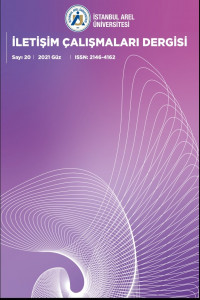Kurum Kültürünün İletişim Memnuniyetine Etkisi
Kurumların yoğun rekabet ortamında var olma mücadelesi verdiği günümüz ekonomik ve toplumsal düzende farklılığı yaratmak en büyük avantaj olarak karşımıza çıkmaktadır. Kurumların farklılık yaratabilecekleri ve rakiplerinden ayrışabilecekleri en önemli unsur ise kurum kültürüdür. Çünkü kültürün var olduğu yerde oluşum, gelişim, değişim ve yenilenme gibi birçok yapılanma karşımıza çıkmaktadır. Kurum kültürü ‘durağan’ değil ‘hareketli’ bir kavramdır ve bu durum da kurumlara önemli bir avantaj yaratmaktır. Kurum kültürünün temelinde insan vardır. Kuruma giren her yeni birey, kurumun kültürünü öğrendiği gibi, bu kültürün taşıyıcısı ve aktarıcısıdır. Kurumların en önemli paydaşlarından olan çalışanlar kültürün aktarımını gerçekleştirirken, çalışanların motivasyonu, tatmini ve kurum içindeki iletişimin güçlü bir şekilde sağlanması kültürün güçlenmesine de imkan sağlamaktadır. Bu çalışmanın amacı, Denison’ın kurum kültürü modeli çerçevesinde, çalışanların iletişim memnuniyetini belirlemektir. Bu doğrultuda, örnek kurum olarak seçilen Garanti Bankası çalışanlarıyla anket çalışması yapılmıştır. Kurumun kültür yapısı bu model çerçevesinde ortaya konulmuş ve bu yapının iletişim memnuniyetine olan etkisi tespit edilmeye çalışılmıştır. Yapılan çalışma sonucunda, Denison’ın kurum kültürü modelinde bulunan misyon, uyum, katılım ve tutarlılığın, iletişim memnuniyetine olan etkisi belirlenmiştir. Denison’ın kurum kültürü modeli faktörleri ile iletişim memnuniyeti arasında uyum öğesi haricinde anlamlı bir ilişki bulunmuştur. Bu tespit, kurumun yöneticileri ve çalışanlarının algıladıkları ‘kurum kültürü’ ile ‘iletişim memnuniyeti’ arasındaki ilişkiyi değerlendirmemiz açısından önem taşımaktadır.
Anahtar Kelimeler:
Kurum Kültürü, Denison’ın Kurum Kültürü Modeli, İletişim Memnuniyeti., etki, makale
The Effect of Corporate Culture on Communication Satisfaction
Under today’s intensely hectic corporate atmosphere where companies wage a war survival, creating a differentiating edge can be considered as the greatest advantage. Corporate culture is the most significant factor in which corporations could create differences and differentiate form its competitors. Because as long as culture prevails, there certainly will be various structures such as formations, development, change and innovation. Corporate culture is a dynamic and unstable concept and this situation creates a significant advantage to the corporations. There are human beings on the basis of the corporate culture. Each new personnel starting to work for the coproration, he/she learns the culture of the corporation and as well as is the carrier the transmitter of this culture. While the employees, one of the most important public of the corporations, carry out the transmission of culture, employee motivation, satisfaction and ensuring a strong corporate communication can strengthen the corporate culture. The aim of this study is to determine the communication satisfaction within the framework of Denison’s Coporate Culture Model. Therefore, a survey was conducted to the employees of Garanti Bank as our sampling. The structure of corporate culture was revealed within the framework of this model and then the effect of corporate culture on communication satisfaction was determined. As a result of this study, it was determined that mission, adaptability, involvement and concistency, which are the factors of Denison’s Coporate Culture Model, have an effect on communication satisfaction. The factors of Denison’s Coporate Culture Model were significantly associated with communication satisfaction except the factor of adaptability. This finding matters in terms of the assessment the relationship between corporate culture and communication satisfaction the employees perceived.
Keywords:
Corporate Culture, Denison’s Corporate Culture Model, communication satisfaction, article, article2,
___
- Crino, M.D., ve White M.C.(1981). Satisfaction In Communication: An Examination Of The Downs-Hazen Measure. Psychological Reports. 49,3, 831-838.
- Çetin, M.Ö.(2004). Örgüt Kültürü ve Örgütsel Bağlılık. 1. Basım. Ankara: Nobel Yayın.
- Denison Consulting. http://www.denisonconsulting.com. 05 Ocak 2013.
- Denison, D. R., ve William S. N.(2008). Denison Organizational Culture Survey, Facilitator Guide. Understanding Organizational Culture And Its Impact On Performance And Effectiveness. Washington, Denison Consulting, LLC.
- Downs, W. ,ve Michael D. H. (1977). A Factor Analytic Study Of Communication Satisfaction. The Journal Of Business Communication. 14, 3, 63-73.
- Eren, E. (2007). Örgütsel Davranış ve Yönetim Psikolojisi. 10. Basım, İstanbul, Beta Basım.
- Eroğlu, E., ve Özkan G. (2008), ‘Analyzing The Relationship Between the Organizational Culture and Communicational Satisfaction And An Application In Eskişehir Woodlands Administration’, 6th International Symposium Communication In The Millennium, İstanbul, s.799-813.
- Fey, C. F. (2000), ‘Organizational Culture And Effectiveness: The Case Of Foreign Firms In Russia’ , SSE/EFI Working Paper Series in Business Administration No. 2000:4.
- Newstrom, J.W., ve Davis K.(1993). Organizational Behavior At Work, 9. Basım, New York: McGraw-Hill Inc., 1993.
- Schein, E. H. (2004). Organizational Culture And Leadership. 3rd Edition, United States of America: The Jossey-Bass Business&Management Series.
- Pearce, C. G., ve Segal G. J.(1998) Effects Of Organizational Communication Satisfaction On Job Performance And Firm Growth In Small Businesses.http://www.sbaer.uca.edu/research/sbida/1998/pdf/27.pdf, s.5, (02.Mayıs.2012).
- Statistical Packages For the Social Sciences, http://survey.lrt.com.hk/limesurvey/index.php. 15 Ocak 2013.
- Tabachnick, B.G., ve Fidell L.S. (2007) Using Multivariate Statistics. 5th Edition, New York, Pearson.
- Thayer, L.(1968). Communication and Communication Systems in Organization, Management, and Interpersonal Relations. 1st Edition, Homewood, IL: Richard D. Irwin Inc.
- Yahyagil, M. Y. (2004). Denison Örgüt Kültürü Ölçme Aracının Geçerlik ve Güvenirlik Çalışması: Ampirik Bir Uygulama. İ.Ü. İşletme İktisadı Enstitüsü, Yönetim Dergisi. İstanbul, 47, 53-76.
- ISSN: 2146-4162
- Yayın Aralığı: Yılda 2 Sayı
- Başlangıç: 2017
- Yayıncı: İstanbul Arel Üniversitesi
